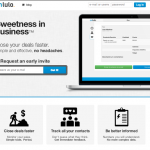My conversation with Jeffrey Eisenberg, co-author of the book, Call to Action
 When I spoke with Jeff Eisenberg several days ago, I was prepared to get some valuable insights into how to effectively use the Internet to increase conversions and sales. I was, nonetheless, incredibly impressed by how succinctly he was able to break down key concepts (nothing impresses me more than the ability to simplify the seemingly complicated). Nevertheless, the I was completely flabbergasted by the fact that he had been to Latin America many times (20 times to Colombia), his Latin American heritage (his parents are from Argentina) and his fluency in Spanish.
When I spoke with Jeff Eisenberg several days ago, I was prepared to get some valuable insights into how to effectively use the Internet to increase conversions and sales. I was, nonetheless, incredibly impressed by how succinctly he was able to break down key concepts (nothing impresses me more than the ability to simplify the seemingly complicated). Nevertheless, the I was completely flabbergasted by the fact that he had been to Latin America many times (20 times to Colombia), his Latin American heritage (his parents are from Argentina) and his fluency in Spanish.
Jeff and his brother, Brian, are well-known experts, speakers, consultants and authors within the online sales/marketing industry and from my conversation with Jeff, it’s obvious that they intimately understand Latin America (more on this a little later). Given the fact that Latin America is at an inflection point in terms of growth in online marketing and ecommerce, having access to world-renowned experts in the field who not only know the language, but also, the culture, should be viewed as a gift from the heavens. Forgive the hyperbole, but Latin America is one of the fastest growing regions in the world (in some cases, the fastest) in terms of Internet adoption with over 100M users and a growth of over 30% and it’s time that companies in the region seek out the top experts in the field to take advantage of the fact that most of their customers are active online.
The reason that Jeff is so knowledgeable about the region is that his previous job within the financial industry brought him many times to Latin America on business. Also, his parents immigrated to the states from Buenos Aires in 1962 and since Spanish was spoken at home (as in my case), he and his brother are completely fluent. Given this fact and the business context described above, I’m surprised that Latin American firms haven’t contacted him for consulting and speaking engagements in order to leverage the knowledge and experience that he brings after working with clients such as NBC Universal, Overstock.com, Dell and Volvo.
Talking about Colombia, I mentioned that, though this country is a leading technology adopter with more users on Facebook than any other Latin American country, I’ve only seen organizations with some exceptions take initial steps at developing and executing online strategies. I also mentioned that eCommerce still has quite a ways to go. Jeff’s answered this observation with a question: “Are we [Colombian companies] waiting for countries such as Argentina, Mexico or the US to take our market?” In my view, that is most definitely the question to ask and this scenario will, indeed, occur if local companies don’t awaken to the opportunity.
With respect to eCommerce, Jeff mentioned that the key catalyst for increasing activity in this area will most probably come from new mobile initiatives down the road. Nevertheless, regardless of what happens on the eCommerce front, there is a plethora of options that Latin American organizations have available to them to interact with their customers. Basic websites were fine to start off with, but, asJeff mentioned, when a customer clicks on a hyperlink, that customer is asking a question such as “How much does this cost?” If a company’s website answers that question with something like “We’re great,” the conversation has little chance of going further and a key conversion opportunity has been lost. In the current economic environment, wasting these types of opportunities is becoming an unaffordable luxury.
More than anything, according to Jeff, digital technologies are forcing more and more transparency on all types of organizations and this new environment can be scary. In order to succeed, organizations need to be authentic and offer real and tangible differentiators. Initiatives such as reputation management, online reviews and participating in online conversations with prospects and customers can yield substantial results.
Either way you look at it, Latin America is at a cross roads. Everyday companies are feeling more competitive pressures from outside their country’s borders, their prospective customers are flocking to digital media and differentiating themselves is getting harder. Sticking to traditional techniques of marketing their wares at the expense of newer, more cost effective channels (where their customers are congregating), is a paradigm that will be less and less effective. Experts such as Jeff have been working with growing stable of companies in other regions with compelling results. The time has arrived for Latin America to begin amassing its long list of regional success stories before others do it for them.
 One of the companies that we’re accelerating at Socialatom Ventures is called Lulo. That happens to be the name of a tropical fruit as well as a new startup focused on making running a small business fun. They’re starting out with the sales process and, although us techies like to talk about terms such as CRM and Marketing Automation, they’re objective is to provide the simplest and easiest to use tools to nontechnical business owners. Sure, they’ll include functionality that crosses some product categories, but that doesn’t mean that their target customer will be interested in such categorizations.
One of the companies that we’re accelerating at Socialatom Ventures is called Lulo. That happens to be the name of a tropical fruit as well as a new startup focused on making running a small business fun. They’re starting out with the sales process and, although us techies like to talk about terms such as CRM and Marketing Automation, they’re objective is to provide the simplest and easiest to use tools to nontechnical business owners. Sure, they’ll include functionality that crosses some product categories, but that doesn’t mean that their target customer will be interested in such categorizations.


